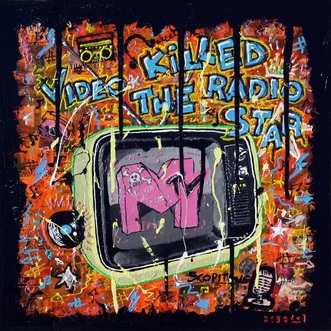
In this essay Jason Eastman, Editor-in-Chief of SociologySounds, explores the value-added by music videos when instructors use song to teach sociological concepts. SociologySounds is a website that helps educators find sociological music to play in their classes. Fittingly, The Buggle’s "Video Killed the Radio Star" was the first video played on MTV. While the song lyrics explain how the beginning of television marked the end of radio’s golden age, its more general, Frankfurt School-like critique about how technology inevitably changes aesthetic expression was symbolically perfect for this milestone in popular culture. Theodor W. Adorno, the leading musicologists of the first generation Frankfurt School and almost every punk rocker since thought new technologies that diffuse culture undermined the ability of music (and art more generally) to achieve its essential social function: inspiring audiences to critically assess and hopefully better understand themselves and their social reality—oftentimes by connecting our emotional and rational selves to the larger social and institutional processes we experience collectively. Both the critical theorist and the punk rocker in me will always be a little leery of the nexus between music and economics. Also, the musician in me also knows no technology will ever surpass the collective experience of hearing music at a live performance—when an audience watches and hears a musician create an emotive expression that only you and the limited people around you will ever experience as an interconnected, harmonious group when all the sounds, beats, melodies, tones, and timbers come together and then disappear just as fast as they were created (although I do write on SociologySounds that Billy Joel’s video and song for “Piano Man” comes close). On the one hand, fears that technology will undermine the expressive ability of music are not entirely misplaced—especially because, as the Frankfurt School pointed out, the economic or political control of communication technology often equates to control of expression (and I recognize there is a lot of problematic tripe finding its way to listeners’ ears these days). Yet on the other hand, throughout the last century every new technology that musicians and music scholars originally feared—from records, to radio, to video, to Napster, to whatever is created today—some pioneering artist is able to effectively incorporate in their musical expressions. So while the goal of SociologySounds is to coordinate the sociological community’s effort to extract songs’ capacity to inspire critical assessment of social reality, we regularly come across musicians who enhance their recorded musical messages with video. In fact, as a collection of audience-submitted music that sociology instructors can use in their classrooms, the site is not only of songs but also of music videos that undermine the Frankfurt School’s fear that technology denigrates cultural expression. In fact, many of these videos help songs communicate these critical theorists’ more general argument that capitalism is not only alienating, but modern economics fetters our progress toward achieving an enlightened modernity.
Once I became Editor-in-Chief, the first song submission we received also has a video that exposes the alienation in capitalism that was the foremost concern of the Frankfurt School. While “Cats in the Cradle” is primarily about socialization and the family, it captures one of the most consequential aspects of alienation given how many people sacrifice time with their children to pursue economic success. When preparing this anonymous submission, I was listening to this song for the first time as a father—and I remember thinking how strange at that very moment I was ignoring my infant daughter in order to post a song warning people to be careful about balancing work and families. Perhaps because of what I was feeling at this time, instead of incorporating Harry Chapin’s original song, I linked to Ugly Kid Joe’s version because the accompanying video includes powerful images that look like home movies which actually show, as opposed to just lyrically describing, the mistakes a father made throughout his life.
Fiasco’s video is also interesting because modern technologies enable almost anyone to mimic this style of videography by adding their own imagery to songs, thereby self-creating original videos that can be shared world-wide with a brief upload. This means that while SociologySounds is full of official artist videos, the vast majority of links provided are fans’ uploads of their favorite artists via YouTube videos. A few of these self-created videos are especially insightful, like zelja tebrex’s video interpretation of Rage Against the Machine’s “Ghost of Tom Joad” which incorporates an immense collection of video from both movies and documentaries that help put this Dust Bowl refugee into the context of our own times. While this practice is far removed from a live musical performance, it does mirror a basic process in which an individual emotional resonance with a song is shared collectively with others—and it is only possible because of new technologies. In fact, tracing the lineage of this video illustrates how new medias and technologies can enhance rather than undermine the communicative power of art to collectively diffuse a message that is also individually meaningful. Tom Joad was first a character in Steinbeck’s “Grapes of Wrath,” which inspired the Woody Guthrie song “The Ballad of Tom Joad,” which became the basis of both John Ford’s film adaptation of the novel, and Bruce Springsteen’s song “Ghost of Tom Joad,” which was then covered by Rage Against the Machine, which was put to images by zelja tebrex on YouTube before it was passed along to SociologySounds by Josh Greenberg. With each (re)interpretation, an audience-artist critically engaged the expression of their predecessors to make sense of their own contemporary reality, which was uniquely translated into another expression that was then passed along to others. This sharing of an evolving artistic expression shows that while artists and sociologists often fear new technologies, and that the forms of expression they make possible will undermine the creation of insightful art, nearly the opposite seems to happen. Also, perhaps the most effective way sociology instructors can play a role in diffusing music’s especially powerful critiques of the social world that are both individually meaningful but also communally uniting is simply by exposing students to meaningful songs—and that’s why we at SociologySounds are quietly exuberated yet also apologetic because we can never seem to keep up with all the great song suggestions passed along to us. Still, if you know of song that can be used to teach sociological ideas, please consider submitting it to SociologySounds. We also have a comment section where you can add tips about how the songs already posted can be used in the classroom. Endnote: SociologySounds was started by Nathan Palmer of SociologySource.org. In July 2012, Jason Eastman became Editor-in-Chief of SociologySounds.
Jason Eastman
Jason Eastman is Editor-in-Chief at SociologySounds and an Associate Professor at Coastal Carolina University. He researches how inequality is perpetuated through culture, often by focusing on the construction of identities through rock and country music, including specific bands like The Rolling Stones and an entire subgenre of country devoted to truck drivers.
Nazmul Alam
2/2/2013 11:42:39 am
Excellent. But would you not consider, We din't start the fire, material girl, Stupid girl etc
chris
8/30/2013 04:54:30 pm
music is so powerful to engage students. I use it always. Have students change lyrics but maintain same sentiment in illustrating a concept Comments are closed.
|
.
.
Tags
All
|

 RSS Feed
RSS Feed